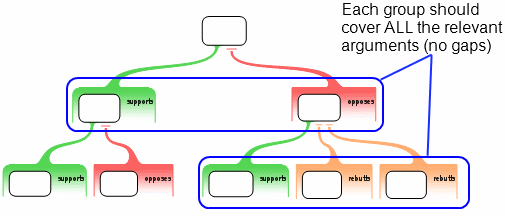
 |
|
|
|
|
| 6.6 MECE - Collectively Exhaustive | |
The second aspect of the MECE rule is the "CE" part: that within any group,
the reasons and objections should be Collectively
Exhaustive - that is, between them, they should cover all the arguments
relevant at that point.

| Discussion |
On p.9 of Apollo Moon Landings, the author asks "What evidence is there that the Apollo Moon landings actually took place?"
Three separate issues are considered; Moon rocks, telescope photos, and "Occam's Razor." If you look closely at the discussion of telescope photos, you'll see that it does not actually present evidence that the Apollo Moon landings took place; rather, it explains why a certain category of possible evidence is not available. So really only two arguments are raised:
Note that the Occam's Razor reason needs further elaboration; only the first premise has been provided here, and the co-premises are needed for the reason to make sense.)
The important issue here is whether the argument is Collectively Exhaustive - that is, whether the group of considerations currently listed as bearing on the main contention.
Even if you consider only the supporting evidence (i.e., ignoring all the objections for the moment), the argument is not collectively exhaustive. There are other reasons to believe that the Apollo astronauts landed on the Moon.
For example, one very general kind of argument that the Apollo astronauts landed on the Moon goes along these lines: landing on the Moon was an enormously important political goal, and the U.S. had the technical capacity to achieve it. Thus, it is likely that the Apollo astronauts did in fact land on the Moon.
When this reason is added, the argument map looks like this:
This reason may be somewhat controversial, but a complete argument map considers all arguments, not only the ones deemed to be good by a particular observer.
You may want to consider if there are any other arguments, at this level, which should be added:
"Collectively exhaustive" means that the group covers ALL the arguments. It is an interesting question what all means here. Roughly, it means all relevant, serious arguments. These include:
There is no need to put on the map considerations which are obviously completely irrelevant or absurd.
| New Concepts |
Collectively exhaustive (CE): Within a group, considerations should cover all the relevant, serious arguments; they should leave no gaps. CE is the second aspect of the MECE rule.
The MECE Rule: Considerations in a group should be mutually exclusive (no overlaps) and collectively exhaustive (no gaps).
| Glossary | Contents | |
|
Copyright © Austhink 2003-2006 |
|
Last updated 28-Nov-2006